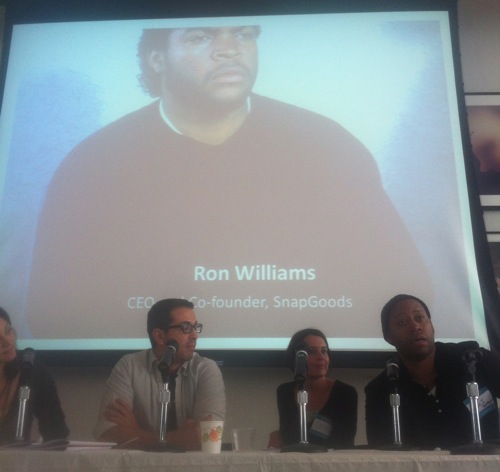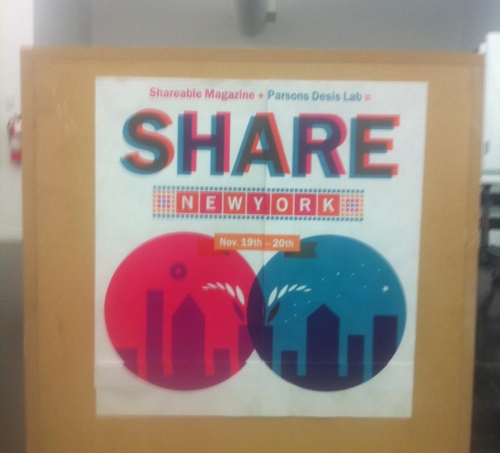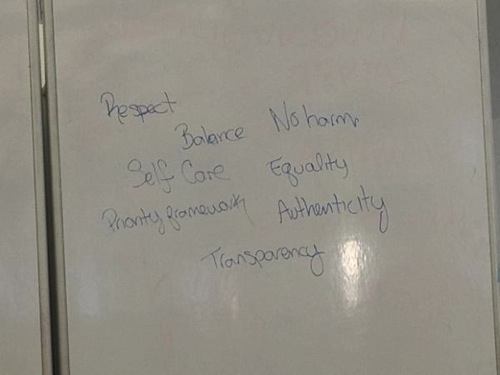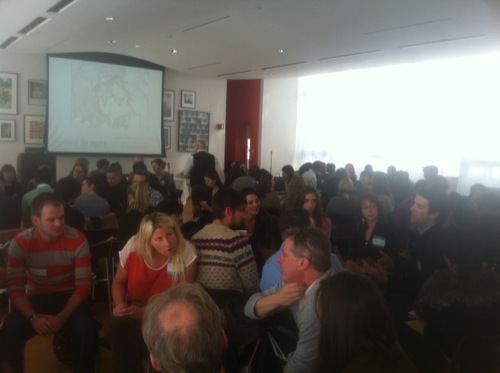Organized by Shareable and Parsons Desis Lab, SHARE New York took place at Parsons the New School on Saturday, November 19th and Sunday, November 20th, 2011. Put simply, SHARE New York investigated the failing economy and what can be done to address it. Given the momentum of the Occupy Wall Street movement and last Thursday's Day of Action, these topics took on added urgency. Instead of focusing on the causes of wealth inequality and the broken economic system, panelists and attendees explored how we can create our own jobs, social enterprises, and support systems in order to thrive, and how we can do it together. University students, social innovators, designers, entrepreneurs, and other interested citizens engaged in two days of dialogue, collaboration and participation.
Below is a recap of the conversations, debates, and ideas that emerged from the weekend, collected from my own notes and tweets by attendees, which can be found at the #shareny hashtag. Not all the quotes are precise since the event was covered in real-time, but are as close to the speakers' intentions as possible.
DAY 1: Saturday, November 19th, 9:30am – 4pm
Cameron Tonkinwise, Ph.D of Design Thinking and Sustainability at Parsons, opened the weekend with a number of provocative framing questions for participants to consider:
- Is the economic situation just a phase we are going through or are we going to make things different? How are we sure this is not just a phase?
- Is this an alternative form of capitalism? Is collaborative consumption just another type of consumption? Or is it an alternative to capitalism? Can the two coexist?
- Will this only be for us, meaning the non-diverse current sharing community? How do we make sure that un-like people cooperate?
- Should design be doing this? Is this a design problem? Should it be slow and local? Should design make it automated or should be about the friction-filled work of talking to people?
Shareable's community builder Milicent Johnson followed with a welcome and orientation, acknowledging the "incredibly eclectic constellation of people knowing that we need to do things differently" in attendance.
Conversation 1: Share or Die, Youth in Recession – Moderated by Malcolm Harris
- Sam Miller, Anti-war organizer and Author of Life in the Non Profit Industrial Complex
- Willie Osterweil, Author of Revolution in Spain, Film Editor for The New Inquiry
- Drew Little, Idea Engineer, Founder, The Illuminated Ventures Project
- Jenna Brager, Author, Who Needs an Ivory Tower? and Creator of Sassyfrasscircus
- Eric Meltzer, Blogger, Student, Author
Shareable's life and art editor Malcolm Harris engaged a group of entrepreneurs, activists, and authors in their 20's in a discussion of how the current economy is creating both obstacles and opportunities for Gen Y, and whether Occupy Wall Street and social entrepreneurship can collaborate.
Malcolm Harris started the dialogue by alluding to 2011's youth movements around the world, noting that "what we're facing is not just a domestic crisis." The panel explored the Occupy movement's impact, and the need to expand both the sharing economy and the Occupy movements out of urban centers. Jenna Brager said that Occupy has already gained support outside of urban areas, and that "If we view Occupy Wall Street as only an urban movement we’re going to fail."
There was disagreement among the panelists about solutions to the economic and social problems. Drew Little explained that he "would love to take the Silicon Valley model and apply it to urban areas around the country, to fuse technology and social good." Willie Osterweil responded, “I agree with your diagnosis and completely disagree with your prescription…if we work together on a real project for social change, I don’t think it can work in this economy.” Little's take on capitalism and the sharing economy is that "capitalism is like a caterpillar, and the sharing economy is like a butterfly rising from it." Osterweil disagreed, stating, "I feel like capitalism is a giant spider." Little's argued that “Occupy needs to use purchasing power for social change. The ultimate occupation is occupying money for social good.”
The panel fielded questions from the audience, and discussed the dubious value of internships and the labor practices of non-profit organizations. Malcolm Harris noted that non-profit organizations are not seen positively by Gen Y workers, noting “the ethical distinction for young people between non-profit and profit institutions has broken down…non-profits don’t treat their workers well.”
Breakout session #1 — Obstacles and Opportunities
The first conversation was followed by a breakout session in which participants explored the economic, environmental, and social issues we're facing, what attendees' biggest challenges and concerns were, and what opportunities are at hand to make things better.
Sharing Lunch
It was a Shareable lunch, as attendees made sandwiches for one another and discussed situations they've experienced in which sharing went good as well as situations where sharing went bad.
Conversation 2: Pioneering a New Economy – Moderated by Neal Gorenflo, Publisher, Shareable Magazine
- Caroline Woolard, Co-founder, OurGoods and Trade School
- Matthew Brimer, Founding Partner, General Assembly
- Lauren Anderson, collaborative consumption speaker, advocate and Innovation Director with The Collaborative Lab.
- Tal Beery, Activist, Educator, and Co-founder of the Orev House
- Ann Herpel, General Coordinator, Park Slope Food Co-op

In order to bring ourselves out of recession, we must pioneer a new economy based on sharing, collaboration, localism, and solidarity. Neal Gorenflo facilitated a dialogue with individuals who are creating alternative economies and networks of solidarity, and explored how collaboration is the key to supporting onesself. Gorenflo framed the discussion with a direct, but far from simple, question: "We are facing systemic problems, so how can we share and build better lives?"
The group spoke about the relative merits of various models—social entrepreneurship, co-ops, non-profits, and more—and how the sharing economy can scale. As Lauren Anderson emphasized, "Collaborative consumption is about making sharing scale." Ann Herpel noted that "the Park Slope Food Co-op grew from 10 people effort to a community model generating $44 Million in sales last year."
The group also investigated how change agents can help spread the message of the sharing economy. Caroline Woolard noted that 2012 is the UN’s International Year of Cooperatives, which is an opportunity to inform people about collaborative consumption. Panelists discussed best strategies for communicating the advantages of collaborative consumption to those who are doubtful. Tal Beery acknowledged that "part of the challenge is that we have to be marketing an idea," adding, "we are moving into a place where we can consider the efficiencies of sharing. When we consider and explain the efficiencies, it's more palatable to people."

The group also spoke about how to best manage collaborative workplaces. Ann Herpel stated that "you need to make a space where people can actively participate, where it’s clear how they can participate. We’re not going to come up with a new economic system, so you need to engage the democracy of the co-op model." Caroline Woolard emphasized the importance of trust, saying, "you need to build trust, and enter the group acknowledging what you need to work on yourself, with self-awareness. Acknowledge that this is an experiment, no one knows that there is a solution, its about being responsible for the exchange. I like the phrase 'intentional infrastructure'—everyone has an intention and is transparent about it." Ann Herpel spoke of the delicate balance of welcoming new people into a cooperative, "of appealing to people’s self-interest while teaching them what a cooperative is. It’s a constant project."
The group also spoke about the challenges of running a cooperative and social-oriented business in the current economy, and how to succeed without undermining your core values. Matthew Brimer said that "you have to ask yourself, are you creating and adding value, or are you extracting value?" Looking to the future, Caroline Woolard stated that we're going to have to establish a "hybrid economy". In response to an audience question about howcohousing is different than the failed communes of the '60s, Tal Beery responded that for a successful cohousing arrangement, members "have to pay attention to the needs of each member. You can’t live in a dorm the whole life."
Conversation 3: How are they doing it? – Moderated by Barbara Pantuso, co-founder of Hey, Neighbor
- Campbell McKeller, Founder, LooseCubes
- Danya Cheskis-Gold, Community Manager, Skillshare
- Erin Barns, Co-founder, Ioby
- Ron Williams, CEO and Co-founder, SnapGoods
- Marcos Salazar, Author, the Turbulent 20s Survival Guide, and Founder of Be Social Change

The third conversation of the day investigated how one forges their own path. Social entrepreneurs who have created a business or nonprofit explained how creating a startup has provided personal meaning and community, and how they make it work. Campbell McKeller explained that "You’ve got a strike a line between a collaborative approach and what you need to be rigid and practical about. Find what will make your business successful and don’t be pushed around."
In response to an audience question about how to financially sustain yourself while launching a social enterprise, the group debated whether to quit your day job and focus. Ron Williams argued that "If you’re going to be really out there building, your risk profile is going to change if you quit your day job and have to sink or swim." Marcos Salazar disagreed. "If you’re getting something good out of your day job, you should stay in it," he said. "If you’re trying to create a social venture, you’re trying to solve a problem that will take years. You have to take into consideration the financial pressures you will face." Williams acknowledged that there are steps entrepreneurs can take before leaping into self-employment. He said, "There are ways you can test the value proposition of what you want to address before you leave your day job—run Facebook ads, monitor conversions, for example."
Campbell McKeller noted that "Coworking is an incredibly important resources if you are changing industries." As for rasing capital, Barbara Pantuso explained that "Hey, Neighbor went through an incubator program. Though I’ve been in the digital space for my entire career, I didn’t know anything about startups or venture capital. Incubator programs are like school for start-ups." She also emphasized the importance of getting advice from those who have succeeded, and making connections, stating "you cannot be afraid to ask for that cup of coffee—go to conferences, meet people, and ask them if they have 15 minutes." Erin Barns pointed to the book Business Planning For Social Impact as a useful resource, and noted that "writing a business plan, and sending it to people you trust who are smart, is also a great plan."

Responding to an audience question about how each panelist defines success, Ron Williams said, "I use the word ‘scale’ a lot. Whatever you’re bounded by, you have to find ways to get your idea to more people." Danya Cheskis-Gold stressed the importance of focus and iteration, saying, "know what stage you’re at. You don’t have to have a perfect product at launch. We got a little confused at first, but once we identified the product side, we focused, focused, focused."
The group also considered how startups can measure the success and usefulness of a service for users. Marcos Salazar asked "how do we measure the connection of two ideas coming together, having sex with one another, and doing something awesome. How do we develop metrics? It’s important to be experimental and iterative." Danya Cheskis-Gold responded, "I came from a very data-oriented world when I came to Skillshare, but when you don’t have many people you don’t have data. If you’re doing something innovative, you’ve got to be testing ideas and doing analytics on how they work. You’re not always going to have numbers, so you’ve got to trust your gut until you have meaningful metrics."
Breakout Session #2 – How are you going to start up your own life?
The second breakout session of the day posed a number of related questions: if you're going to have to forge your own path, how will you do it? What change strategy appeals to you (entrepreneurship, sharing, collaborative consumption, bartering, etc.) and why? What are some things you'd like to start implementing in your life?
The day closed with a report back from participants on their insights and reflections from the day. Attendees chose items to bring for the next morning's potluck breakfast.

Participants then headed over to Hostelling International for the SHARE New York mixer with food, drinks, and live jazz courtesy of the Kai Ando Trio.
[slideshow]
DAY 2

Day two focused on the nuts and bolts of making change, inviting participants to brainstorm and design solutions to community challenges, and learn how to build alternative models of solidarity such as co-ops and collectives. The goal was to leave attendees with a tool kit of resources to help them change the world, and support themselves in the process.
Roadmap for Success
After a potluck breakfast, Social Entrepreneurs Collective Co-founder Shana Dressler laid out a roadmap for manifesting ideas into reality, and led participants through the exploration process of becoming a changemaker. Dressler invited attendees into a conversation about how they personally defined success, what were their sense of ethics and responsibility, and how that informed their work. Responses included respect, balance, self-care, authenticity, and transparency. Dressler emphasized, “don’t let mistakes hold you back. Mistakes are inevitable. Embrace them, they will be your greatest teachers.”

Photo via dandon on Twitter.
Dressler laid out the best practices for starting a project:
- Step 1: Start with a beginner’s mind.
- Step 2: Acknowledge background noise–the “shoulds”, etc.
- Step 3: Create space.
- Step 4: Discover your dream. She noted, “in the US, we can, for the most part, afford to dream, so it is a shame not to.”
She then enumerated the essential paths to success:
- Start w/ strongest idea. Jump in by yourself or find a partner and learn by doing
- Begun by working with someone who is doing something that interests you. Find a teacher.
- Stay in the Inquiry.
Dressler asked the crowd what they considered obstacles to success. Responses included a lack of time and resources, distraction, and self-doubt. She acknowledged importance of finding ways to pay the bills, and how important financial solvency is to creating great work, stating “getting some freedom around your conversation about money is very important.”
Breakout Workshops
The rest of day two of SHARE New York was devoted to breakout workshops in which attendees brainstormed with successful social entrepreneurs how various entrances into the sharing economy. The workshops included:
- Startup Bootcamp for Budding Social Entrepreneurs and Nonprofit Founders
- Setting up Systems of Sharing and Solidarity, and the Connection Between Occupy Wall Street and the Solidarity Economy
- How to Design for Social Innovation and Sustainability
After the workshops, participants reconvened for a report back on their insights and takeaways, and engaged in an idea-dating session to discuss what they had learned over the weekend. Snacks and beverages were served as attendes explored their ideas and projects with one another to the strains of gypsy jazz and folk.
—
DOWNLOAD THIS RECAP AS A FREE EBOOK:
- ePub version (Supports most eBook readers, including the iPad and Nook)
- Kindle version
- PDF version
RESOURCES









